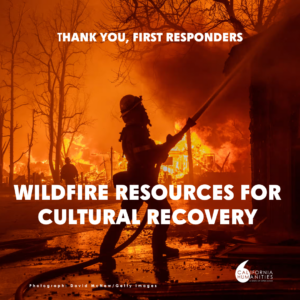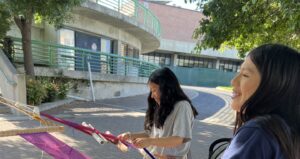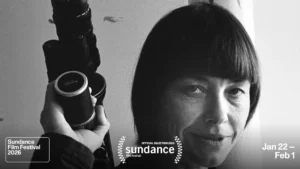“My hope is that viewers can re-imagine work and value people who do the essential labor of picking and processing our fruits and vegetables. We all need to eat, and the adage ‘domestic labor is the labor that allows for all other labor’ is indeed true, and yet those who perform agricultural and domestic labor too often live in destitution.” –filmmaker Emily Cohen Ibañez
Set in an agricultural town on the central coast of California, FRUITS OF LABOR is a coming-of-age story about an American teenager traversing the seen and unseen forces that keep her family trapped in poverty. Ashley is a seasonal strawberry picker and factory worker who dreams of graduating from high school and attending college. But in this coming-of-age tale, tensions build as Ashley’s family struggles with poverty and the threat of family separation due to increased deportations in her community.
In honor of this month’s Labor Day Holiday, Senior Program Officer John Lightfoot spoke with filmmaker and California Documentary Project grantee Emily Cohen Ibañez about her recent documentary.
Please introduce yourself and tell us some of your background as a filmmaker and anthropologist.
I’m Emily Cohen Ibañez, a Latinx filmmaker with Colombian and Syrian-Jewish heritage. I make films that center women’s lives at the intersection of labor, food, and environmental justice. I aim to change the world and people’s perceptions of it through lyrical storytelling that embraces the magical realist heritage of Latin America. I am also an anthropologist. I earned my doctorate in Anthropology at New York University, where I learned the art of documentary filmmaking. As a filmmaker, I contend with anthropology’s and the documentary field’s colonial heritage, which guides me to question the relationship between documentarians and so-called “subjects.” I question power in all its forms in my film practice, whether I am looking at food systems or the filmmaking process itself; I also actively harness the power that elevates women’s voices, including my own as a marginalized filmmaker. For this reason, I employ collaborative approaches to my work where those in front of the lens are acknowledged as active storytellers alongside myself and my film team, which are comprised predominantly of women of color. Most importantly to me, through film, I aim to create spaces of joy and healing while facing life’s hardships and pain.
Your current documentary, FRUITS OF LABOR, tells the story of Ashley, a Mexican American teenager living in California’s Central Coast who is torn between finishing high school and working to support her family picking strawberries. How did you first get to know Ashley, and can you tell us more about her and some of the obstacles she faces?
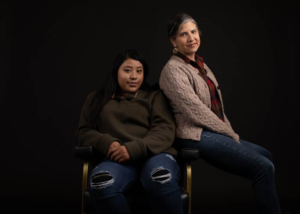
I met Ashley when she was 15 years old. I was teaching Visual Sociology at the local university and proposed that my video lab students work collaboratively with a group of youth activists who had founded a community garden in their neighborhood. We created the River Park Garden Video Collective, which culminated in a community film about the garden. Ashley was one of these youths. She stood out. Ashley was a socially engaged young person who cared about improving life for herself, her family, and her community. I got to know Ashley and her family over several years. After the 2016 election, I observed that all the youth in the video collective started working in the fields, replacing undocumented adults who feared deportation raids. I did not see any mainstream media reporting on this troubling trend and felt that a story needed to be told. Ashley was entering her last year of high school. So I approached her about making a film, initially intended to be a short, about her hopes, dreams, and challenges while working in the fields, a night shift at a factory, and trying to graduate from high school.
In the film, you will see the various challenges Ashley faces, including working grueling hours to help support her family, which leads Ashley to fall behind in her school attendance and studies and suffer. She suffers from sleep deprivation and
overall well-being. In addition, although herself born in the United States, Ashley fears her mother will be deported, and her younger siblings will become her sole responsibility, thwarting her dreams of a more promising and economically stable future. But ultimately, FRUITS OF LABOR is a hopeful story, and I believe Ashley will be a role model to many youths who share her experiences.
You and Ashley collaborated closely to make this film. Can you describe that process and why that was important to you?
Anytime a filmmaker makes a documentary, they are closely collaborating with those in front of the lens, especially for character-driven verité filmmaking. It’s impossible not to. For one, access relies on people’s willingness to trust the filmmaker capturing their lives, especially for filming intimate scenes at home, the workplace, and school. People in front of the lens have the power to say “no,” not to cooperate, to set boundaries of when to let you into their lives or not, and as a documentarian, it is important to respect those boundaries; otherwise, you can’t make the film. I think what makes FRUITS OF LABOR different is that it acknowledges the collaboration and credits Ashley, the film’s protagonist, with a co-writing credit, bringing her more explicitly into the fold of creative storytelling.
It was important for me to bring her in this way because I have found writing to be a powerful tool for healing where people can reflect and come to understand their experiences. Stories are like frames, transforming the way people look at personal, painful experiences. They create a pathway towards a more profound understanding of oneself and the world. At the end of the day, I believe this is why people make and watch films, to learn lessons on how to live well. In Ashley, I saw a young person overburdened by responsibilities beyond her age. My hope was for Ashley to experience the joy of collaborating with me in telling her story–to reflect, grow, and see a hopeful path towards her future. To co-write, I used grant money so that Ashley could leave her work responsibilities for two one-week writing retreats where we would watch edited scenes and reflect on them together. We did various exercises to open up to deeper emotions at these workshops, including a 4-hour voice and acting workshop with Cristal Gonzalez from Teatro Campesino.
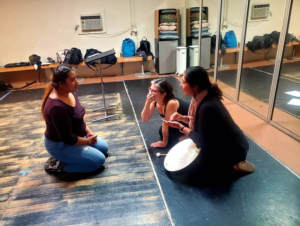
In our writing session, I acted as a guide to shape her expressed feelings into prose that Ashley could then read for recorded narration. I also shared with Ashley some of the ways I came to understand her predicament and that of our world through scholarship like Braverman’s Monopoly and Labor Capital and Zora Neale Hurston’s Their Eyes Were Watching God as well Brecht’s notion of “epic theatre.” As a former college professor, I enjoy engaging young people in these conversations and took some liberties in the co-writing to incorporate those references–for example, the “production line moves in linear motion” and allusions to “kissing bees” –these are subtle references to Braverman and Hurston that the viewer does not need to know but might and nonetheless were part of making this film.
In terms of process, the co-writing contributed to strengthening my relationship with Ashley, better incorporating her point of view authentically into the film, and was a way for Ashley to heal from the daily traumas of poverty and the threat of family separation.
While the film focuses on Ashley’s story, what are some of the universal themes that the film explores?
The central theme of the film is one that I believe many of us can relate to, which is the tension between family obligation and one’s dreams of pursuing personal freedom and independence. Other themes are those of the classic American coming-of-age story, which have to do with teenage angst–the sometimes awkwardness of falling in love for the first time, worrying about grades, dreaming about college when the future feels so uncertain, finding the right fitting prom dress, and wondering about the meaning of one’s existence–in one of my favorite scenes, Ashley asks her boyfriend if he believes in ghosts and reincarnation. They also reflect on their own spirit animals and who they are as people in the world. Of course, all of this is happening in the context of economic precarity, an increasingly dangerous predicament that is all too common for American children and families today.
Given that this interview is timed to coincide with Labor Day, what do you hope audiences will take away from the film regarding work and opportunity?
My hope is that viewers can re-imagine work and value people who do the essential labor of picking and processing our fruits and vegetables. There is an ideology in America that promotes the belief that “if you work hard, you can get to your dreams,” as stated by the high school principle in the film. While hard work can lead to one’s dream vocation, many forms of work, including agricultural and domestic labor, are undervalued despite their fundamental value to society. We all need to eat, and the adage “domestic labor is the labor that allows for all other labor” is indeed true, and yet those who perform agricultural and domestic labor too often live in destitution. The denigration of agricultural and domestic labor is a vestige of American slavery. In slavery, masters and landowners forced people to migrate and work the land, they racialized them, and they treated them as less than full human persons. When FDR put forth the New Deal that offered worker protections for so many Americans, it excluded protections for agricultural and domestic workers. This exception was made to appease Dixie Democrats during Jim Crow, who could not exclude explicitly by race, so created an exclusion for entire sectors of the economy worked by Brown and Black people. These are all historical facts you will learn in the film; Ashley lives this legacy, as do the many working children and adults that share her experience. My hope is that the magical and lyrical elements invite viewers to re-imagine the value and beauty of working the earth and growing food that ultimately nourishes our bodies and spirits.
Finally, after premiering at the 2021 SXSW Film Festival, where will audiences be able to see FRUITS OF LABOR next?
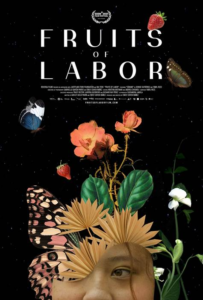 We are super proud to announce that our film will have its POV national broadcast on October 4 with 30 days of streaming. We will launch our social impact campaign a week before broadcast, bringing the film to farmworker communities in free outdoor screenings. Please stay tuned because September and October will bear much fruit for the rollout of our beautiful film! We’ve had an amazing festival run from SXSW to Hot Docs to Full Frame to Los Angeles International Latino Film Festival. Upcoming festival screenings are Cultures and Communities Film Festival September 6-12, Boston Latino International Film Festival September 24-Oct 3, Bright Lights Film Series September 29, and New Orleans Film Festival November 5-21.
We are super proud to announce that our film will have its POV national broadcast on October 4 with 30 days of streaming. We will launch our social impact campaign a week before broadcast, bringing the film to farmworker communities in free outdoor screenings. Please stay tuned because September and October will bear much fruit for the rollout of our beautiful film! We’ve had an amazing festival run from SXSW to Hot Docs to Full Frame to Los Angeles International Latino Film Festival. Upcoming festival screenings are Cultures and Communities Film Festival September 6-12, Boston Latino International Film Festival September 24-Oct 3, Bright Lights Film Series September 29, and New Orleans Film Festival November 5-21.
Anything else you’d like to add?
To find out about upcoming screenings, news updates from our social impact farmworker screenings, and more, please sign up for our newsletter through the film’s website at fruitsoflaborfilm.com. Please also follow us on social media: @fruitsoflaborfilm on Instagram, @FrutisLaborFilm on Twitter, and @fruitsoflaborfilm on Facebook. Thank you!
FRUITS OF LABOR is supported by California Humanities through a California Documentary Project Grant.


